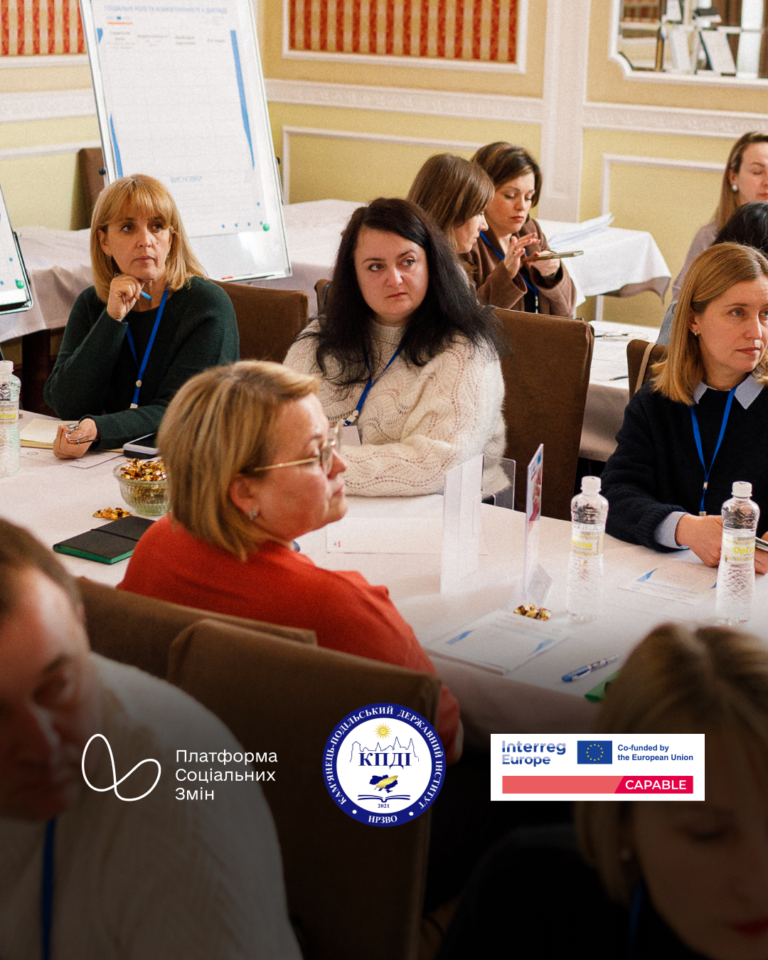How Entrepreneurship Education is Transforming Rural Schools into Hubs of Change: a case study by the Platform Social Change

In rural Ukraine, young people, especially teenagers and those from vulnerable backgrounds, face systemic challenges such as limited access to quality education, shortage in career guidance, and few professional opportunities. The war has only worsened the situation, affecting over 75% of youth since 2022, with rising mental health concerns, income loss, and educational setbacks (UNDP, 2024).
Yet, these very youth can be powerful changemakers, if given the right tools, skills, and support. That’s the belief driving the Platform for Social Change, whose vision is to become the center of social entrepreneurship development for small communities in Ukraine, and whose mission is to make social entrepreneurship a platform for local initiatives driving global change.
A New Educational Model
To address the school-to-work gap, the Platform launched an innovative leadership and entrepreneurship program through a series of school-based bootcamps. This hands-on initiative guides students from ideation to action, equipping them with entrepreneurial mindsets and skills to solve real problems in their communities.
Each bootcamp followed the Start → Grow → Impact model:
- Start: Students identify local challenges and generate project ideas
- Grow: Through team-building, communication, and creativity workshops, they develop practical and emotional skills
- Impact: They design, test, and present projects—with access to mentors and micro-grants to bring ideas to life.
Bootcamps in Action
The program reached 570 students across six rural communities, offering 30 sessions, 45 hours of training, and mentorship from eight industry experts. Five high-impact themes shaped the curriculum: digital marketing, employability soft skills, social enterprise, eco-awareness, and project management.
Mental Health Innovation
Recognizing the emotional toll of war, the program uniquely integrated mental health support. Partnering with Ukrainian startup Anima Help, students used AI-based eye-tracking tools to assess their emotional well-being, followed by one-on-one and group sessions with psychologists. Over 700 hours of counseling helped students build resilience alongside practical skills.
Mentorship and Project Incubation
After bootcamps, students didn’t walk alone. Each project team received structured one-on-one mentorship from industry professionals. These mentors guided students through:
- Writing grant proposals
- Managing project implementation
- Navigating team dynamics
- Preparing public presentations and impact stories
Group mentorship sessions were also held each term to share feedback, encourage peer learning, and cultivate leadership.
Funding Futures: Turning Ideas into Real-World Enterprises
Promising student teams pitched their projects for micro-grants. Four initiatives received direct funding, transforming classroom ideas into sustainable, school-rooted social enterprises. This structured financing approach ensures students not only learn business skills but also apply them with visible impact.
Examples of funded projects:
- TeaGrow (Kadiivtsi Lyceum) – herbal tea production combining agro-skills and healthy living.
- GreenVibe Greenhouse (Letychiv Lyceum #2) – cultivating seedlings for community sales, linking biology and business.
- Compost Station (Dunaivtsi Lyceum #4) – a school-based zero-waste project tackling food waste through composting.
- Fruit Snack Startup (Zhvanets Lyceum) – producing and selling healthy fruit snacks, blending tech lessons with real business practices.
Each project is designed for long-term sustainability within the school. It involves new student cohorts each year and nurtures local ecosystems of youth-driven change.
The Results: Empowered Youth, Empowered Communities
- 40% of students reported increased confidence in creating change locally.
- Over one-third noted personal growth and stronger teamwork.
- Schools observed more student-led initiatives and community involvement.
By embedding psychological well-being, entrepreneurship, and real-world applications into education, the Platform for Social Change is proving that rural schools can become engines of innovation and hope even in crisis.
What’s next?
With strong outcomes in hand, the Platform for Social Change is:
- Scaling the model to more schools and regions
- Supporting long-term development of youth-led enterprises
- Strengthening partnerships with educators and local governments
This isn’t just education reform, it’s a roadmap for how rural schools can become engines of resilience, innovation, and hope.



